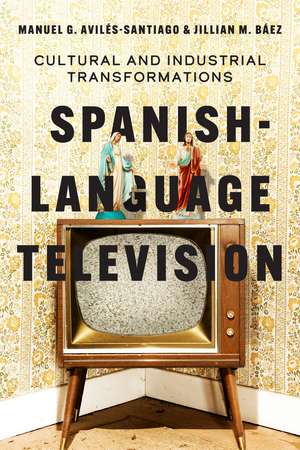Spanish-Language Television: Cultural and Industrial Transformations
Autor Manuel G. Avilés-Santiago, Jillian M. Báezen Limba Engleză Paperback – 13 mai 2025
The US television industry has suffered blow after blow amid media convergence and the rise of streaming. Those legacy broadcasters that survive are much diminished and highly dependent on live programming—the last redoubt of old media. There is an exception, though: Spanish-language television is thriving.
Spanish-Language Television surveys the Latinx media landscape to better appreciate why Univision and Telemundo have flourished while others faltered. Manuel G. Avilés-Santiago and Jillian M. Báez show that the major Spanish-language networks are unusually flexible and open to innovation in hopes of reaching new demographics. Univision and Telemundo were early to streaming. To appeal to “billennial” audiences—bilingual millennials—who threatened to stray from TV, they rebuilt the telenovela, which now features social commentary, diverse characters, and genre crossovers. Today’s reality programs defy old norms of linguistic correctness, and the airwaves are becoming less hospitable to racism and sexism, resulting in rising ratings and ad revenues. The first book-length treatment of reception patterns in Latinx TV, Spanish-Language Television deepens our understanding of new media in a moment of transformation and possibility.
Preț: 264.26 lei
Nou
Puncte Express: 396
Preț estimativ în valută:
50.57€ • 55.10$ • 42.61£
50.57€ • 55.10$ • 42.61£
Carte nepublicată încă
Doresc să fiu notificat când acest titlu va fi disponibil:
Se trimite...
Preluare comenzi: 021 569.72.76
Specificații
ISBN-13: 9781477331163
ISBN-10: 1477331166
Pagini: 208
Ilustrații: 8 b&w photos
Dimensiuni: 152 x 229 mm
Greutate: 0.45 kg
Editura: University of Texas Press
Colecția University of Texas Press
ISBN-10: 1477331166
Pagini: 208
Ilustrații: 8 b&w photos
Dimensiuni: 152 x 229 mm
Greutate: 0.45 kg
Editura: University of Texas Press
Colecția University of Texas Press
Notă biografică
Manuel G. Avilés-Santiago is a professor of Communication and Culture at Arizona State University. He also serves as the vice dean at the College of Integrative Sciences and Arts. He is the author of Puerto Rican Soldiers and Second-Class Citizenship: Representations in Media.
Jillian M. Báez is an associate professor in the Africana, Puerto Rican, and Latino Studies Department at Hunter College, City University of New York. She is also on the doctoral faculty in Women’s and Gender Studies at the CUNY Graduate Center. She is the author of In Search of Belonging: Latinas, Media, and Citizenship.
Jillian M. Báez is an associate professor in the Africana, Puerto Rican, and Latino Studies Department at Hunter College, City University of New York. She is also on the doctoral faculty in Women’s and Gender Studies at the CUNY Graduate Center. She is the author of In Search of Belonging: Latinas, Media, and Citizenship.
Cuprins
- Introduction
- Chapter 1. Speaking To Billennials: Linguistic Flexibility in Reality Television
- Chapter 2. Framing Race in Spanish-Language Television
- Chapter 3. Latin(¿qué?): Let the Audiences Speak!
- Chapter 4. Streaming Media, Nostalgia, and the Future of Spanish-Language Television
- Conclusion
- Acknowledgments
- Notes
- References
- Index
Recenzii
Jillian Báez and Manuel Avilés-Santiago offer an authoritative and insightful lens for this pivotal work. Spanish-Language Television: Cultural and Industrial Transformations presents a powerful case for the creation of a distinct subfield within media studies and Latinx media studies focused on Spanish-language television. Readers gain a deep understanding of how Spanish was central to the foundation of Spanish-language television, while also tracing the ways in which the language has evolved in tandem with technological advancements, demographic changes, and more. In the end, Báez and Avilés-Santiago reveal how television and its Latinx audience have mutually influenced each other, undergoing a dynamic and reciprocal transformation.
Spanish-Language Television: Cultural and Industrial Transformations offers insights into pressing challenges within the industry, such as advocating for a more critical examination of Spanish-language television’s approach to race. In this ever-changing panorama, nothing is set in stone. Therefore, Jillian Báez and Manuel Avilés-Santiago provide an outstanding contribution to how we rethink our notions of what television is, who it serves, and how content should be circulated.
Descriere
How Spanish-language television networks continue to thrive in a rapidly changing media landscape.
